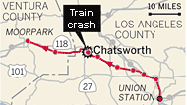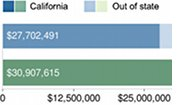Teacher responses to the 2010 release
The following is a list of teacher responses to their "value-added" ratings during the intial release in 2010. See the most recent responses »
The Times gave LAUSD elementary school teachers rated in this database the opportunity to preview their value-added evaluations and publicly respond. Some issues raised by teachers may be addressed in the FAQ. Teachers who have not commented may do so by contacting The Times.
|
|
 Delicious
Delicious
|
 Digg
Digg
|
 Facebook
Facebook
|
 Twitter
Twitter
|





My math rating takes a hit due to the fact I taught a split grade level 4th grade / 5th grade classes, not only in 2008, but also at least one other year not acknowledged in my profile for some reason. Still, I thought my math rating would be higher. OK, I will work on that more.
I feel my overall rating would be higher too if students were tested on their essay writing skills. Compositional writing skills is the main focus of my humanities instruction because it integrates all the critical Language Arts components.
Finally, I bring artistic appreciation, critical thinking, and many life experiences to the classroom as a 'second career' educator that are not measured with this California CST exam value added analysis.
nevertheless, objective evaluation like this is sorely needed inside the LAUSD Stull (teacher evaluation) process.
More importantly, making such OBJECTIVE value-added info public will spur competitive people such as myself to work twice as hard. I am human after all. If my principal were to whisper in my ear that I am a great/awful teacher, it's still just an OPINION without objectivity to support it. I thrive on objectivity. BRING IT ON!
August 30, 2010 at 4:05 p.m.
Shame on the L.A. Times for publicly shaming my colleagues!!!!!! As much as I wanted to stay far away from the DRAMA, until being officially back to work, I could not resist the temptation of opening up the article. I AM OUTRAGED!!! HOW DARE THE LA TIMES take "OUR" ( students', teachers', & schools') precious data and manipulate it. More importantly, how can anyone, who is not a TEACHER, even begin to understand the complexities pertinent to standardized testing. THIS PUBLIC SHAMING IS WRONG ON SOOOOO MANY LEVELS!!!! We, as educators, must stand together on this. Today you may be deemed a "Most Effective" teacher, but tomorrow you may be that humiliated teacher who receieves a "Least Effective" ranking. I am disappointed with teachers, who have bought into this whole notion of the "Value -Added" approach. We, are the ONLY ones (not L.A. Times reporters/ researchers/ writers, bureaucrats, politicians, and even some administrators and parents) who TRULY understand the challenges WE face, as educators in one of the most troubled school disctricts. It is ludicrous to think that this database can accurately rank our performance/competence when these standardized tests do not take into account the many contributing factors that affect scores (i.e. ELD levels, IEPs, grade level standards, testing irregularities, etc.) I am deeply troubled to know that we, as professionals, have worked hard for our Teaching Credentials (a significant number of us even pursuing graduate work) and that we are fair game for the media. Hmmmmm..... it is my sincere hope that UTLA will respond (but I will not hold my breath). To all my fellow teachers, who ARE "THE REAL DEAL" , let's keep our heads up and our eyes on the prize :)
August 30, 2010 at 12:20 p.m.
Last week I was an "average" teacher when your analysis was for 2004-2007. Apparently you have gone back further in my career and included my 2003 year as well and now I am a less than average teacher. Thank you for making such an accurate assessment of all of the hard work and dedication I have had as an educator. Your "thorough" analysis of my teaching skills and impact on children, based upon one narrow measure is really great journalism.
Do you think that teachers should base student grades on one assessment (CST)? No. Teachers use multiple measures to gauge a student’s performance throughout the year. Formal and informal evaluations such as quizzes, tests, performance assignments, quarterly assessments are all factored in to the equation.
Here's a novel idea: Why don't you visit all of the classrooms of the teachers you have published in this database and observe their impact on the classroom throughout the year (after you have had training in what to look for in a highly engaged classroom); interview students, parents, colleagues, and administrators about the teachers you are evaluating; follow the teachers before and after school and on weekends to see all of the extra lesson planning, grading, participating in adjunct assignments, attending students’ birthday parties and baptisms. Perhaps then you will have a whole picture as to whether or not an individual is “effective” or not.
I definitely believe that using Value Added is a great conversation and should be looked at each year to help better our craft and profession. However, to publicize what is in effect a research paper, without the consent of the people you are writing about, is in my opinion highly unconscionable.
I am sure that you have “added value” to the amount of newspapers you have sold during the past few weeks.
August 30, 2010 at 9:17 a.m.
It is sad to see the L. A. Times as the leading anti-teacher voice in our community.
Any evaluation of teacher performance should be done only by that teachers supervisor in private. Too many dedicated, caring people work too hard every day to be disparaged like this.
August 30, 2010 at 7:54 a.m.
I think that a healthy dialog regarding how to gather and use data to measure teacher effectiveness is good, as long as it is coupled with a healthy dialog on how to address the other areas that impact a student's academic success, among these of which are, in no particular order: (1) Student effort as evidenced by student attendance and homework completion rate; (2) the District selected curriculum and the effectiveness of training teachers in this curriculum, which in large part impacts teaching as these are the tools we teachers are given; (3) parental involvement and a stable, loving home; (4) the prior level of achievement and mastery of the student; and (5) the leadership provided by the school's principal and administrative team. I as a teacher try to do everything I can to make my students effective, as I truly believe that all students can achieve success, but also realize that I do not control everything that goes into the success or lack thereof of my students.
How do you measure whether or not a student is putting in their best effort? Perhaps homework completion and attendance could be a measure of this. For the most part, my students do well in completing their homework as they know that they will stay in during recess to finish what was missing, but I have still had cases where a student does little or no homework, despite repeated conversations with parents and having positive and negative consequences for homework completion.
How do you measure the effectiveness of the curriculum chosen by the District? I do my best to guide my teaching based on the state standards, not necessarily the curriculum, but there is a limit to what a teacher can create or find on his or her own when the curriculum that has been handed to him or her doesn't cut the mustard for a particular standard, or does not teach the standard in a way that one's students understand. Also, how well does the District curriculum match the diverse needs of its students? For example, LAUSD uses Open Court for its elementary language arts program, which essentially has only one reading level per grade (in contrast, when I worked as a teacher in Chula Vista a student's reading instruction was based on his or her actual reading level, not his or her grade level). Is this the best approach in a district that has such a high level and range of English Language Learners? How do you measure the impact of district-wide decisions on the effectiveness of teachers?
Thirdly, how do you measure the effectiveness of parenting on a student's academic success? Again, homework completion rate may be one of many measures of this. It also surprises me that one of the things that most impacts our society is the raising of children, and that no parenting classes are required for high school graduation (the other area that greatly impacts our society where virtually no education is given prior to high school graduation is the area of money management).
Fourth of all, how do you account for a student's prior level of achievement? Obviously, a student who has developed his or her academic skills further than others is more prepared for their new grade level when they move up. Also, how come we socially promote students systematically in the elementary years? There should be some clear minimum threshold that must be achieved to move on the next grade level. Otherwise, what is being communicated to the student by this system of social promotion is that it doesn't matter if you work hard or not, you're still going to move on to the next grade level. Then we wonder why many students start dropping out in middle school and high school when they flunk, or as I can attest to as a fifth grade teacher, students arriving many years behind when they start a new grade level. Accountability for the student should start early. It should also be obvious that if a student is not being held accountable in some meaningful way for his or her performance when it comes to moving up a grade level, how do you realistically expect that student's performance on a standardized test to be reflective of the quality of the teaching?
Finally, how do you measure the effectiveness of the local school site leadership? How do you know whether the leadership provided results in teachers becoming better each year, or whether the leadership provided does not encourage growth as a teacher? I have worked under three different principals in two different school districts (my first three years of teaching were at Feaster-Edison Charter School in the Chula Vista Elementary School District), and can say that all three principals managed their schools in different ways and thus produced different results. In one school we were given at least four hours per week of paid time to collaborate with colleagues, were visited by an administrator at least once a week during random, unannounced times to have our teaching observed (with feedback and questions given to foster reflection on one's own teaching), and had professional development that was meaningful, engaging, and provided strategies that were clearly implementable in our classrooms. Clearly, this administrator knew what was happening in the classrooms at his school, and his meaningful involvement established him as an academic leader in the eyes of the teaching staff. The feedback and collaboration also resulted in new teachers receiving the support they needed to establish themselves as professional educators. In contrast, at another one of my schools, I was rarely visited while teaching (perhaps once every two to three months), and when I was visited, was not always given feedback. When I was given feedback, it was easy to see that this administrator was out of touch with what was happening in the classroom, perhaps because this administrator rarely set foot in one. Collaboration was expected to happen on teachers' own times, which meant that with every teacher having different schedules and commitments on "their own time", collaboration rarely happened. Time was inconsistently given for grade-levels to meet for an entire day on some months and only a few times for one hour in a week, but for the most part these were top-down and not responsive to the needs of the grade level or the needs of the teachers or their students. Professional development was for the most part very abstract, with no concrete strategies given to teachers and no time given for teachers to collaborate on meaningful ways to implement strategies in the classroom. It is easy to see how the lack of collaboration, meaningful professional development, or guiding administrative presence in the classroom itself lent itself to producing new teachers who were not consistently effective, and also lent itself to the inability to determine whether a lack of effectiveness was due to a lack of support or due to a person not having the right qualities to be an effective teacher. How do you measure the impact of local school-site decisions on the effectiveness of teachers?
To conclude, I hope that this has shown that while a teacher is a very important part of the equation in producing successful students, that the teacher is not the only highly significant part. I also hope that I have shown that the teaching that is imparted in the classroom, while reflecting in a large part on the teacher, is also a large reflection on the choices that districts and school-site administrators make and implement. All these questions and observations that I have made have been done so in the spirit of finding ways to improve our system of educating our next generation of people. None have been made in the spirit of complaining, but in the spirit of trying to point out how things really are, because that is what allows us to strategize and move forward in a better way. I challenge the LA Times to provide meaningful research in these other factors I have mentioned, as only a wholelistic approach will result in the re-creation of our schools as a world-class education system.
August 29, 2010 at 9:57 p.m.
I saw my score about month a ago and I declined The Time's invitation to comment on my score because I believe what the LA Times is doing is absolutely trifling, insulting, irresponsible, and most of all inaccurate.
August 29, 2010 at 7:20 p.m.
This is totally offensive, and in no way measures my success as a teacher! Did you consider the fact that I usually get a lot of behavior problems as well as students with special needs? This is ridiculous as I consider myself a good teacher. How do you base a teacher's score on 4 days of students taking a test? Have you also considered how much harder each grade is? Have you considered that maybe students are not good test takers? This whole thing is ridiculous, and I now refuse to buy your newspaper.
August 29, 2010 at 4:16 p.m.
Although I am happy with my overal rating, I still do not believe that these ratings reflect a teachers effectiveness in the classroom. There are so many variables that should be considered before any test results should be made public. To say that gifted students or Eld learners have no meaningful advantage or disadvantage in their abilities to test is ridiculous...and only those teachers who are working in the classrooms will be able to understand this!
August 29, 2010 at 1:20 p.m.
It should be an honor to see that I am one of the most effective teachers at my school, but for me, it is not. I am actually shocked at my ranking. Honestly, I expected to be somewhere between average and more effective. Many of my students have made significant growth in English and Math, but others have not. Each year, my colleagues and I review our students' CST data and use that information to plan instruction for the upcoming school year. I have witnessed both gains and losses in student achievement from year to year, but it seems that the value-added system does not reflect those results accurately. That alone makes me question the validity and effectiveness of this approach to ranking teachers. Many of the teachers from my school who have received a less effective ranking are actually effective, dedicated, and very hard working. Do the value-added scores take into consideration that California State Standards change from grade level to grade level, some more significant than others? This system projects that a student should achieve a certain score or meet a certain level of growth. But, that does not mean that the students will meet that projection or that their scores are a reflection solely on the teacher. I can just imagine how embarrassed I'd feel with a lower ranking. Having said that, I feel hurt and betrayed that LAUSD has released this information. Teachers deserve so much more appreciation for educating our children. We put in numerous unpaid hours of preparation and planning for instruction for our students. We have even agreed to take a pay cut to improve the budget and save our colleagues' jobs. My question now is, why have we, teachers, become targets?
August 29, 2010 at 11:03 a.m.
As I'm sure many people have already commented, one test is not a valid measurement of a child's potential or how much they learned during the school year. All of the outside influences such as did the child go to sleep late the night before, not have breakfast, is abused at home, parents are having problems and on and on also effect how well they do on tests. A child might just be having a bad day. It also kills me when I see the careless mistakes kids make on tests. It doesn't mean that the concept wasn't mastered it just means they made a silly mistake. I have 2 daughters who were never great test takers but they were very hard workers. They both went to college and graduated from USC and UCLA. There are too many outside factors that play into test taking and I resent having my name posted. At least I know that the parents whose children I've taught know what a great teacher I am and constantly tell me and that's what counts.
August 29, 2010 at 9:48 a.m.